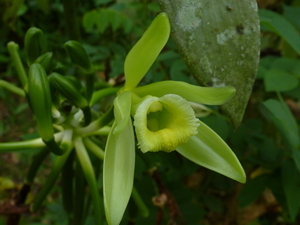The cultivation of coffee, cocoa and vanilla secures the income of many small-holder farmers and is also a driver of land-use change in many tropical countries. In particular, cultivation in agroforestry systems, in which these crops are combined with trees that provide shade, is often considered to have great potential for ecologically sustainable cultivation. Researchers at the University of Göttingen are now showing that the land-use history of agroforestry systems plays a crucial role in assessing the sustainability of agroforestry. The results have been published in the journal Conservation Letters.
Tropical agroforests differ greatly in their land-use history, i.e. the former use of the land now occupied by agroforests. On the one hand, an agroforest can be established directly in a forest – in this case the undergrowth is removed and replaced by vanilla vines, coffee or cocoa bushes. In the process, many plant and animal species and important ecosystem services are lost. On the other hand, an agroforest can be established on land that is open – for example on a pasture or cornfield which was forest in former times but had been cleared for farming. In this case, the land would be replanted with trees, and so animal species that depend on trees may benefit. Trees also store carbon and may have a cooling effect, which can reduce global warming.
"Our results show that agroforestry systems can only lead to a significant enhancement of the landscape for biodiversity if they are established on open land," says Dominic Martin, first author of the study. "The conversion of the remaining species-rich tropical forests into coffee, cocoa or vanilla plantations should, however, be avoided." This requires incentives, adds Professor Holger Kreft, Head of the Biodiversity, Macroecology and Biogeography Group at the University of Göttingen. "Sustainability labels should take this into account and avoid giving certification to plantations that were previously forest. It is really only in this way that the ecological advantages of cultivation in agroforestry systems can be achieved. This can then help to ensure that our morning coffee can be enjoyed without a bitter aftertaste," says Kreft.
The study comes from the multidisciplinary project "Diversity Turn" at the University of Göttingen, which is funded by the Volkswagen Foundation and the Ministry of Science and Culture of Lower Saxony.
Original publication: Dominic Martin et al. (2020) Land-use history determines ecosystem services and conservation value in tropical agroforestry. Conservation Letters. DOI: https://doi.org/10.1111/conl.12740
Contact:
Dominic Martin
University of Göttingen
Faculty of Forest Sciences and Forest Ecology
Biodiversity, Macroecology and Biogeography group
Büsgenweg 1, 37077 Göttingen, Germany
Tel: +49 (0)551 3933167
Email: dominic.martin@uni-goettingen.de
www.uni-goettingen.de/en/128741.html
Professor Holger Kreft
University of Göttingen
Faculty of Forest Sciences and Forest Ecolog
Biodiversity, Macroecology and Biogeography group
Tel: +49 (0)551 3928757
Email: hkreft(at)uni-goettingen.de


